Spring 2026 Events Programme
Doctoral Research Fora
Date: 19th February, 2pm - 5pm GMT
Location: Online (please email corth@sussex.ac.uk for Zoom details)
Join us for the Spring Doctoral Fora as we share and discuss the research of the wonderful researchers and PhD students examining topics in the field of gender, sexuality, sexual/reproductive health, feminist theory, kinship, broadly. The fora is open to a wide range of scholars from disciplinary locations, to share their work in a friendly and open environment.
Information about the speakers to follow soon.
Previous Events
CORTH's Autumn Event Programme
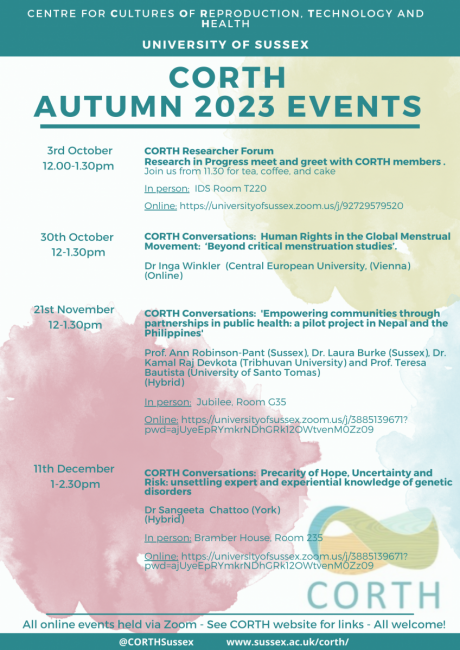
CORTH Conversations: 'Precarity of Hope, Uncertainty and Risk: unsettling expert and experiential knowledge of novel treatments for genetic disorders'
11 December 2023, 1 - 2.30pm GMT
This is a Hybrid event. Attendees can come in-person to Bramber Hourse room 235 or join online at https://universityofsussex.zoom.us/j/3885139671?pwd=ajUyeEpRYmkrNDhGRk12OWtvenM0Zz09 (Passcode 887084)
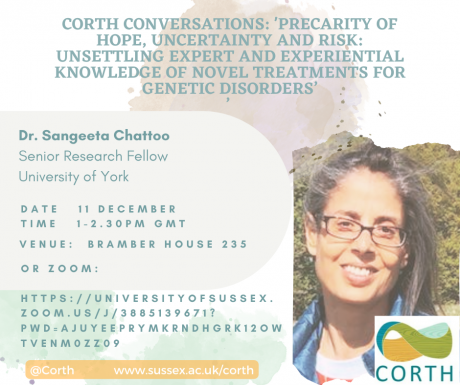
Dr. Chattoo's seminar is based on her paper that looks at the use of ‘novel’ therapies, a combination of thalidomide and hydroxyurea, in treating a potentially life- threatening genetic disorder (thalassemia). Rather than assume that medical knowledge constitutes (of) immutable stable diagnostic/ clinical categories or terms, a lack of consensus within medical/ scientific fraternity on the use of treatment regimens brings home the significance of local practices through which ‘evidence’ is framed to legitimise ‘improvisation’. In focusing on the social milieu within which the materiality of the disease is located, the notions of risk and evidence are foregrounded as processual and shifting in time. Drawing on ethnographic data on how parents of children with thalassemia in parts of rural India negotiate prognostic uncertainty and precarity of caring, knowledge and ignorance production appear as ‘intricately entangled’. The paper concludes with an ethnographer’s dilemma about how to write about what might seem, from the outside, ethically contentious though innovative practices, serving the economic interests of the clinicians and pharmaceutical firms. Yet, from inside, the narratives of parents and patients struggling to access basic care in the state system, persuade us to understand their quest for novel treatments (hope), ilaj (both treatment and cure), as part of a wider pragmatic ethic of care.
Dr. Sangeeta Chattoo is a Senior Research Fellow, in the department of Sociology, at the University of York. She started her ethnographic journey, dating back to her doctoral research on the borderland between medicine and culture in Kashmir (India) in 1985. After completing my doctorate from the University of Delhi in 1990, she taught at the University of Western Australia for two years, took a career- break for five years before joining the University of Leeds and finally migrating to York in 2006. Her research and scholarship have meandered around intersecting lines of medical knowledge and practice; inequalities and health, race, ethnicity, citizenship and governance; chronic illness, gender and caring. Sangeeta has worked extensively on health and citizenship issues of minoritised ethnic communities in the UK. For the past decade, however, she has been fascinated by the history, ontology and governance of sickle cell and thalassemia within a global context and the local engagements with emerging forms of medical practice and claims to citizenship and state. Sangeeta is on the editorial board of the medical sociology section of Frontiers and is currently co-editing a special issue (with Veena Das, Conceptualising technology in reframing the boundaries between the normal and the pathological; and a forthcoming, Handbook on Racism, Ethnicity and Health (with Hannah Bradby, Edward Elgar Press). Two of her recent articles are in Anthropology and Medicine and policy and Politics (profile at https://www.york.ac.uk/sociology/our-staff/academic/sangeeta-chattoo/)
CORTH Conversations: 'Empowering communities through University partnerships in public health: a pilot project in Nepal and the Philippines'
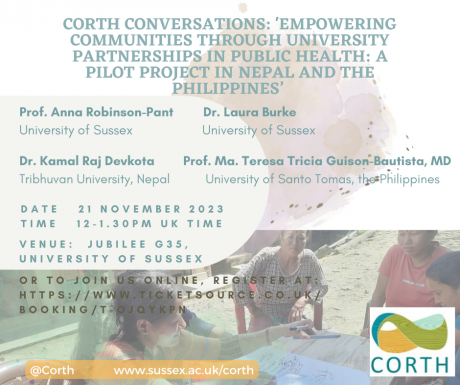
Anna is a Research Professor in the Global Studies School at Sussex. Laura is the project’s Research Assistant, a Lecturer in Global Public Health and a Researcher in decolonising health education at Sussex. Kamal is a Lecturer at the Research Center for Educational Innovation & Development (CERID) Tribhuvan University, Nepal and Teresa is a Professor with the University of Santo Tomas, the Philippines. Both Kamal and Teresa will be participating online.
Read all about the project and talk at -
'Parental Mental Health Network Conference' - An inaugural two-day Conference, bringing together academics, policy makers, clinicians, charities and people with lived experience. See the pdf. for full details of the Coference - Parental Mental Health Conference Itinerary [PDF 547.52KB]
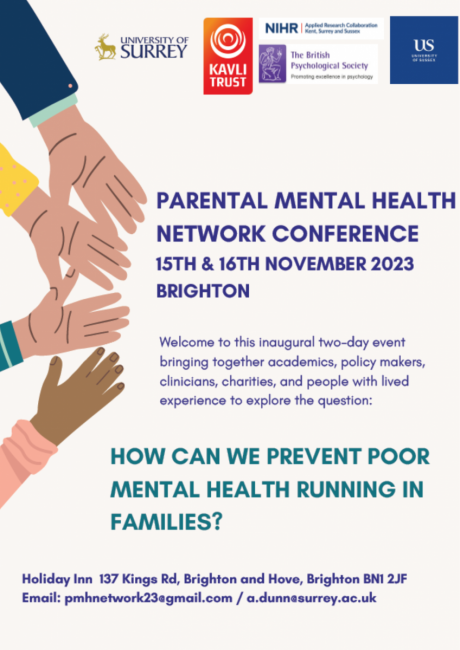
CORTH Conversations: 'Human Rights in the Global Menstrual Movement'
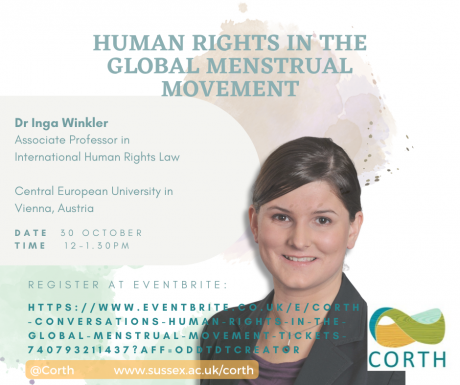
View our past events here.


